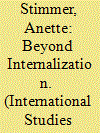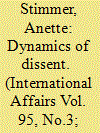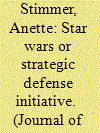|
|
|
Sort Order |
|
|
|
Items / Page
|
|
|
|
|
|
|
| Srl | Item |
| 1 |
ID:
167428


|
|
|
|
|
| Summary/Abstract |
Norm scholars tend to treat norm contestation and acceptance as binary categories. This obscures variation in how much states agree over how to apply international law to specific situations. I distinguish between disagreements over norm frames (justifications) and claims (actions) and thus highlight four different outcomes of norm contestation. These differ in their effects on the clarity and strength of the contested norms, as well as on subsequent debate over them. Specifically, I argue that frame agreement limits the range of actions that actors can legitimately pursue and thus involves norm recognition. In contrast, if states only agree on the action that should be taken, but not on the norm that applies, we see norm neglect. Both outcomes structure subsequent debates, but norm neglect is the more volatile outcome: because of the lack of normative commitment, states can justify the agreed-upon action as exceptional compromise and later revert back to a norm impasse (frame and claim disagreement). However, the joint action may also trigger socialization processes that lead to agreement on both frames and claims—that is, produce norm clarification. Hence, this typology builds a bridge between understandings of contestation as a never-ending debate and as an avenue toward agreement; it helps improve our understanding of compliance mechanisms and of contestation.
|
|
|
|
|
|
|
|
|
|
|
|
|
|
|
|
| 2 |
ID:
167107


|
|
|
|
|
| Summary/Abstract |
A profusion of international norms influences state behaviour. Ambiguities and tensions in the normative framework can give rise to contestation. While research on norm contestation has focused on open debates about norms, we identify a second type of norm contestation where norms are contested through particular forms of implementation. We therefore distinguish between contestation through words and actions, that is, discursive and behavioural contestation. Discursive contestation involves debates about the meaning and/or (relative) importance of norms. Behavioural contestation, by contrast, eschews such debates. Instead, different norm understandings become apparent in the different ways in which actors shape the implementation of norms. Despite being a potentially powerful mechanism of challenging and changing norms, behavioural contestation has fallen outside the purview of the literature in part because it frequently remains below the radar. The two forms of contestation overlap when the practices of behavioural contestation are brought to the attention of and discussed by the international community. Thus, discursive and behavioural contestation are not mutually exclusive but can happen at the same time, sequentially or independently of each other. This introduction to a special section of the May 2019 issue of International Affairs, on ‘The dynamics of dissent’, develops the concept of behavioural contestation and outlines triggers and effects of this hitherto under-researched expression of dissent.
|
|
|
|
|
|
|
|
|
|
|
|
|
|
|
|
| 3 |
ID:
168794


|
|
|
|
|
| Summary/Abstract |
Popular culture can influence debates over security policy. This article studies the use of Star Wars in the debate over Reagan's Strategic Defense Initiative (SDI). The term Star Wars was widely used to refer to SDI during debates in the 1980s. Scholars have pointed to both disabling and enabling effects of popular culture on political debates. This article refines these effects and introduces a third effect that comes from the widespread use of popular culture: a neutralizing effect that turns popular culture references into descriptive shorthands. Studying these dynamics contributes to our understanding of why popular culture is or is not used as a framing device and how it is used and perceived by decision-makers. I rely on content analysis of newspaper articles, congressional records, and political speeches and incorporate findings from elite interviews and the norm literature to conduct my analysis. I find that critics capitalized on linkages between the movie franchise and the policy to frame Reagan's missile defense system as Star Wars and to criticize his policy proposal. This science-fictionalization soon constituted the sociopolitical context surrounding Reagan's missile defense initiative. Most decision-makers perceived the Star Wars label to have a disabling effect as it cast doubt on the viability and desirability of SDI. Opponents initially tried to mobilize this effect, whereas most proponents argued against the label or refrained from using it. Few tapped into the enabling potential of Star Wars to communicate the potential benefits of SDI. The introduction of the professional term SDI helped proponents mitigate science-fictionalization in expert settings, while among the public the widespread use of the Star Wars label neutralized its meaning and turned it into a descriptive shorthand.
|
|
|
|
|
|
|
|
|
|
|
|
|
|
|
|
|
|
|
|
|